Mashgiach
A mashgiach (Hebrew: משגיח, lit. "supervisor"; pl. משגיחים, mashgichim) is a Jew who supervises the kashrut status of a kosher establishment. A mashgiach may supervise any type of food service establishment, including slaughterhouses, food manufacturers, hotels, caterers, nursing homes, restaurants, butchers, groceries, or cooperatives. The mashgiach usually works as the on-site supervisor and inspector, representing a kosher certification agency or a local rabbi, who actually makes the policy decisions for what is or is not acceptably kosher. Sometimes the certifying rabbi (רב המכשיר, Rav Hamachshir) acts as his own mashgiach; such is the case in many small communities.


Requirements
The requirements for becoming a mashgiach are being Jewish, being Sabbath-observant (shomer Shabbat), being Torah-observant (shomer mitzvot), and personally fulfilling the laws of kashrut (shomer kashrut). According to Rabbi Matisyahu Salomon, a senior Orthodox rabbi in the United States, the most important criterion is yirat Shamayim (fear of Heaven).[1]
Many AKO (Association of Kashrus Organizations) member organizations worldwide require a Mashgiach to complete the AKO Mashgiach Course, created by Kosher Institute of America, and obtain a Mashgiach ID Card as a prerequisite to working as a Mashgiach.
A mashgiach takes on a great responsibility and the burden of a community. The mashgiach puts his good name and the name of the community on everything done on his watch.
Gender
Rabbi Moshe Feinstein has permitted a woman to serve as a mashgicha (feminine form of mashgiach).[2]
Although the majority of mashgichim are men, most supervising agencies employ women in this role as well.
Responsibilities
Depending on the assignment, the mashgiach must be familiar with the halakhas of slaughtering meat, cooking meat and fish,[3] and separating meat and dairy. He must be knowledgeable about the way boilers and shipping vessels work, since high temperatures and long storage times can affect the status of kosher foods. It has been said that in addition to knowledge of Jewish law, a mashgiach must be familiar with "engineering, entomology, metallurgy, boiler treatment, food chemistry, and world market trends".[1]
A mashgiach is required whenever meat or fish is prepared or cooked. They check fresh eggs for blood spots before they are used in cooking, and must inspect all vegetables for forbidden insects before use.
The mashgiach is responsible for performing the mitzvah of challah, the tithe of dough set aside for consumption by a kohen. (Some perform this in the diaspora, whereas in Israel it is always burnt.)
The mashgiach must also light pilot lights and turn on cooking and heating equipment to satisfy minimum requirements of bishul Yisroel (food cooked by a Jew) and pas Yisroel (bread baked by a Jew), in a way that a Jew must be involved in the cooking of any kosher food "fit for a king's table."[4] To satisfy requirements for Sephardic Jews, the mashgiah may be required to play an even more active role in the cooking process.
Often, a primary responsibility of a Mashgiach is washing and inspecting produce to ensure there is no infestation. The skill of inspecting produce properly requires much training and expertise.
One of the most pressing jobs of a mashgiach, however, is the checking in and verification of shipments. The mashgiach must ensure that every food product that arrives at the facility has a reliable hekhsher (certification) before it is used. Suppliers often substitute products that are out of stock with non-kosher products. Non-kosher establishments would generally not mind these substitutions. For a kosher establishment, however, these substitutions can cause major problems. If a product arrives without a hekhsher, the mashgiach must make sure the product is clearly marked as non-kosher and is not used, but returned to the supplier. Sometimes a product arrives that is purportedly kosher, but no hekhsher can be found. In this case, the mashgiach obtains a valid letter of certification from the certifying rabbi or kashrut agency, usually by contacting the manufacturer. In addition to checking hekhsherim, the mashgiach must also check that all meat products that arrive are double sealed, usually by inner and outer plastic bags or an inner plastic bag and a sealed box, and that all wine is kosher wine.
Great strides, in the last several years, have been made towards ensuring that kosher products are transported only in kosher approved tanker trucks.[5]
In many settings, the mashgiach is merely responsible for making sure that the above tasks are performed by responsible, knowledgeable, and well-trained persons.
A mashgiach plays social as well as technical roles in explaining kosher rules to the Jewish and non-Jewish community and forging close relationships with employees and customers.[6]
See also
- Kosher certification agency
- Kosher foods – Foods conforming to Jewish dietary law
- Kosher wine
- Hechsher – Kosher certification mark
- Treif – Yiddish for not kosher: non-kosher
- Shechita – Ritual slaughter of an animal according to Jewish law: ritual slaughter
References
- Fishbane, Rabbi Sholem (November 12, 2014). "Understanding the Reliability of Kosher Agencies" (PDF). Ami: 82–85.
- Moshe Feinstein. (סימן מד). אגרות משה יורה דעה חלק שני (in Hebrew). pp. 58–60. Retrieved Apr 13, 2020.
- "The Rapidly Expanding World of Kosher Food". Bloomberg Businessweek. 2010-12-02. Retrieved 2018-04-27.
- Gersten, Eli. "Lo Basi Ella L'orer: Bishul Akum". Archived from the original on 2011-06-06. Retrieved 2009-12-18. the Mashgiach must light the boiler
- Price, Gavriel. "Trucking". Archived from the original on 2011-06-06. Retrieved 2009-12-18.
- A Mashgiach's Job is Never Done Retrieved 2018-04-27.